In a recent development, the Varanasi District Court has granted worshiping rights to the Hindu side in the longstanding Gyanvapi mosque dispute. This decision has dealt a significant setback to the Muslim side, prompting the Supreme Court to direct them to approach the Allahabad High Court for resolution.
The Anjuman Intzamia Masjid Committee, responsible for managing the Gyanvapi mosque, made an unsuccessful attempt to secure an urgent hearing in the Supreme Court to challenge the Varanasi District Court’s order. The order allowed Hindus to perform prayers specifically in the southern cellar of the Gyanvapi mosque.
On Wednesday, the Supreme Court granted permission for Hindu devotees to conduct puja and offer prayers in the basement of the Gyanvapi complex after a hiatus of 31 years. This marks a significant development in the dispute over worship rights at the contested site.
The historical context reveals that the family of Somnath Vyas had been performing puja at the Gyanvapi mosque until 1993. Subsequently, due to a state government order, worship activities were halted in the basement. The recent court decision has now reignited Hindu devotees’ access to the site, particularly in the southern cellar of the Gyanvapi complex.
Notably, the scientific survey conducted by the Archaeological Survey of India last year played a crucial role in this decision. The survey involved a thorough examination and cleaning of the mosque premises, shedding light on the historical and religious significance of the disputed site.
As the legal battle continues, the Supreme Court’s directive for the Muslim side to approach the Allahabad High Court introduces a new chapter in the Gyanvapi mosque dispute. Both parties await further hearings and resolutions in their pursuit of worship rights at this contentious religious site.

















Comments